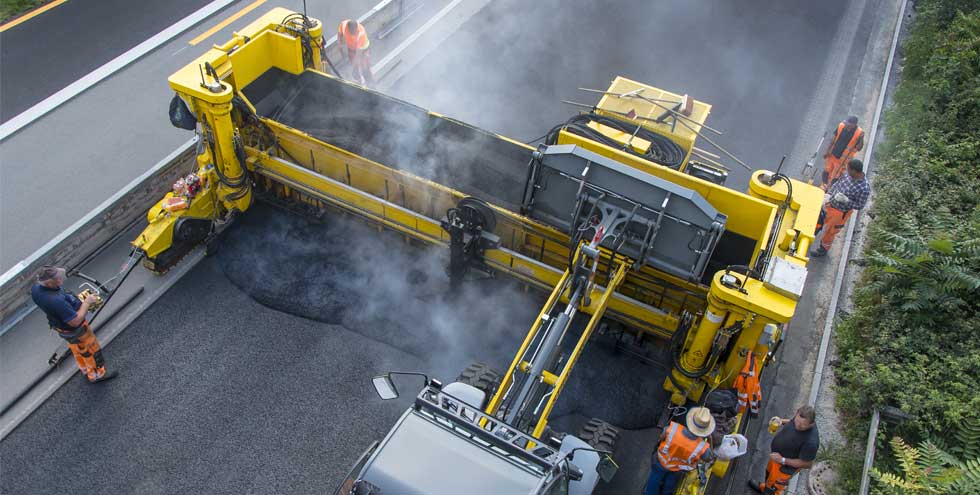The difference between Asphalt and Bitumen is often a common topic of debate as both materials have been widely used to define the same thing for a long time. However, if you ask professionals, they would tell you how Bitumen is actually the binder in the liquid mix that holds Asphalt together. Technically in that way, Asphalt is a compound of sand, aggregates and bitumen wherein Bitumen acts as the binding material to hold this blend of Asphalt together. Categorically, Asphalt is the mix while Bitumen is the cement binder when paving is done. This is how many times a surface is simply coated with the binder that is Bitumen and later topped with aggregates, the same process is then repeated to create two coats.
While the construction of many Bitumen or Asphalt projects, clients and even workers tend to confuse the two. Since now we have an understanding that a bitumen road is essentially bitumen only with aggregates sprayed on top while Asphalt is needed Bitumen for binding it with the rest of the composition, we can move further. Asphalt, the key component in this mixture has its production done in a plant and after a process of heating, drying, and mixing of the aggregates, Bitumen, and sand thoroughly, it is ready for use. This mix is then applied onto the surface with a paving machine as a solid blend with the required thickness as per the required usage. One thing that is known as a fact is that Asphalt offers a more durable as well as smoother surface finish in comparison to Bitumen sealing.
Key Differences Between Bitumen and Asphalt
While there are many things that differentiate the two materials, let us try to understand the key differences between the two materials.
Firstly, Asphalt pavements are more durable with a lifespan of more than 20 years and thickness ranging from 25 to 40 mm. While Bitumen isn’t as durable with a durability of 5-10 years and thickness ranging from 10-20 mm. Asphalt surfaces are also much smoother and skid-resistant, this makes the roads skid-resistant and hence more safe for drivers while creating minimal noise while driving. Bitumen on the other hand has a coarse surface and loose particles which cause more noise and can wear down the tires of the vehicles thus having concerning safety issues. Bitumen also has a higher frictional resistance which decreases the efficiency of the fuel and increases the consumption. Asphalt having lower friction between the roads and tires offers more efficiency of fuel allowing economical use and reduction in CO2 emissions.
Of course with all those advantages comes the cost, making Asphalt costlier to install in comparison to Bitumen. The best part is that Asphalt is an impermeable material that safeguards against leaching. However, Bitumen leaching can cause deterioration of the quality of soil and adulteration of groundwater. Asphalt impermeability reduced chances of infiltration and the spread of pollutants into our natural resources such as water. Asphalt also has an upper hand in temperature resilience. Unlike Bitumen, the material does not get soft and slick in high temperatures. The disadvantageous aspects are only seen when the temperatures are highly hot or cold.
The many pros of Asphalt make it more cost-effective as it does not require any maintenance as such, unlike Bitumen, a mere routine inspection suffices. The Bitumen pavements need to be maintained on a regular basis specifically if resurfacing of high traffic surfaces. This makes Aphalt more cost-effective compared to Bitumen in the long run.
Which One to Choose from Asphalt and Bitumen?
When planning to resurface an area, the best bet is to firstly understand the key goals of your area in question along with the budgets that you would need to adhere to. It definitely pays in the long run to know your purpose. Mostly, if you are looking to resurface driveways, carparks, commercial spaces you would require Asphalt paving. This is primarily because the mix offers higher safety of roads and a high-durability surface for the movement of heavy vehicles and machines. On the other hand, Bitumen is mostly used by suppliers in manufacturing and final binding and sealing of products.
Conclusion
With many differences between Bitumen vs Asphalt and a stark advantage of one over the other, there is not much confusion in finalizing. To conclude, Asphalt is undoubtedly more advantageous with more pros and fewer cons in stark comparison to Bitumen which has more cons and fewer pros. Asphalt is the most used pavement solution as it is cost-effective and durable in the long run. Once installed, you don’t have to spend a lot of energy, time and money on maintaining it. Whether you’re looking to resurface your residential driveway, build a carpark for your commercial space or simply looking to mend the potholes in your surface, Asphalt is the perfect choice for any project that will pay you in the long run in the way of saved maintenance costs and time.


